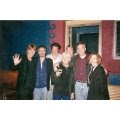
Band: Indigenous
Title: The Acoustic Sessions
Writer: Rick Galusha
In 1995 a band of Native American siblings from the Northern Ponca Tribe Reservation in Wagner, South Dakota released a self-produced album, ‘Awake.’ Now in their 16th year the band has released fourteen full length albums including their newest, ‘The Acoustic Sessions.’ Nanji’s father, Greg Zephier, a friend of actor Marlon Brando, was an activist in the American Indian Movement and named his son for the noted civil rights figure Standing Bear (d:1908).
What started as a tight knit band of family members eventually succumbed to the travails of rivalry, broken relationships, and illicit substance use. When the Davey Brothers, of the successful British band ‘The Hoax,’ informally hovered near the band, the once blues based guitar rock sound of the band moved towards a more contemporary, bottom-heavy, hard rock sound. This new sound and image moved the band towards a larger and younger potential audience but pushed away the loyal base of “Indiginuts.” Their career stalled and internal issues resulted in Wandbi (sister/drummer), Pte (brother/bass) and Horse (cousin/percussion) leaving the band. As a solo act under the name Indigenous, Mato Nanji struggled to re-find his voice and old audience.
With the release of their 13th album, ‘Broken Lands’ Nanji finally looked inward to write about the social trauma’s of 170 years of the reservation system inflicted upon many Native Americans. On the track, “Place I Know” Nanji sang of barefoot children left to raise themselves by alcoholic parents. (Alcohol related deaths on South Dakota’s reservation’s average 1640% higher than median America.) While the song’s structure was not overt blues, the band that had been deserted by many of its fans released one of 2008’s lyrically most powerful blues albums. ‘Broken Lands’ signaled a come back for Indigenous.
Filtered throughout the band’s history has been a collection of excellent songs. Admittedly skeptical of “an unplugged album,” that was comprised of greatest hits, ‘The Acoustic Sessions’ is the second excellent album for an artist that refused to die. In their original form many of the songs featured on this album, while highly melodic and well played, lacked sufficient texture within the album format to compel one to listen to the whole album. Gone for the past several albums have been the depth providing textures that conga player Horse provided the band’s early incarnations. In this acoustic setting Nanji is able to demonstrate his guitar prowess while serving the song and, in many instances, these songs are fully complimentary to the full band versions.
The album opens with the pacing ‘Now That You’re Gone’ where Mato’s vocal energy rises over a layered percussive setting against a guitar solo that recalls some of cleanest fretwork of his career. Now in its fourth released version, ‘Things We Do’ is the song that defines the band musically, lyrically and spiritually. “When I close my eyes, a dream comes to me” Nanji sings as the song builds thanks to the percussion and organ of producer Jamie Candiloro (REM, Willie Nelson, Ryan Adams, Eagles). The albums fourth track, ‘Rest of My Days’ is the album’s focus track where Candiloro’s production eerily recalls Marvin Gaye’s ‘I Want You’ period. The use of subtle ‘toned percussive instruments’ (I don’t know what they are) heightens the song with stunning effect. On ‘Leaving’ Lisa Germano provides a wonderful violin backing that moves to the foreground with a defining solo; wonderfully unexpected.
The album ends with a cover of the Traveling Wilbury’s track ‘You Got It’ penned by Jeff Lynn (ELO) and Roy Orbison (Sun Records). Radio programs that rely on Classic Rock artist may find this track to be comfortable for listeners. However, this album has “legs” so programmers will want to move beyond the obvious and low hanging fruit of a covered hit record.
This album is a powerful statement of revitalization for Indigenous. There is a history that threads throughout popular music of bands releasing three excellent albums consecutively; perhaps there will be another strong album in the future. Fans of contemporary blues-rock players such as Stevie Ray Vaughan, Eric Clapton, Santana and Jimi Hendrix will enjoy this album.











